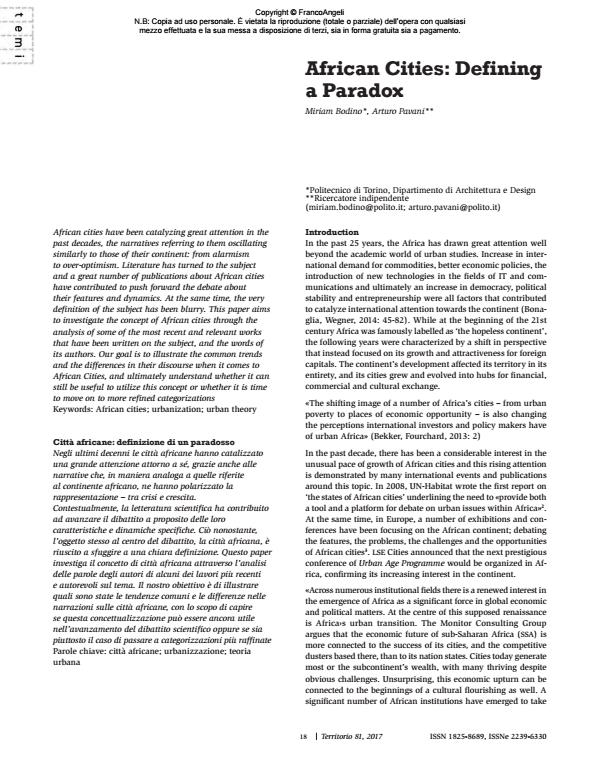African Cities: Defining a Paradox
Titolo Rivista TERRITORIO
Autori/Curatori Miriam Bodino, Arturo Pavani
Anno di pubblicazione 2017 Fascicolo 2017/81
Lingua Inglese Numero pagine 5 P. 18-22 Dimensione file 797 KB
DOI 10.3280/TR2017-081003
Il DOI è il codice a barre della proprietà intellettuale: per saperne di più
clicca qui
Qui sotto puoi vedere in anteprima la prima pagina di questo articolo.
Se questo articolo ti interessa, lo puoi acquistare (e scaricare in formato pdf) seguendo le facili indicazioni per acquistare il download credit. Acquista Download Credits per scaricare questo Articolo in formato PDF

FrancoAngeli è membro della Publishers International Linking Association, Inc (PILA)associazione indipendente e non profit per facilitare (attraverso i servizi tecnologici implementati da CrossRef.org) l’accesso degli studiosi ai contenuti digitali nelle pubblicazioni professionali e scientifiche
African cities have been catalyzing great attention in the past decades, the narratives referring to them oscillating similarly to those of their continent: from alarmism to over-optimism. Literature has turned to the subject and a great number of publications about African cities have contributed to push forward the debate about their features and dynamics. At the same time, the very definition of the subject has been blurry. This paper aims to investigate the concept of African cities through the analysis of some of the most recent and relevant works that have been written on the subject, and the words of its authors. Our goal is to illustrate the common trends and the differences in their discourse when it comes to African Cities, and ultimately understand whether it can still be useful to utilize this concept or whether it is time to move on to more refined categorizations
Negli ultimi decenni le città africane hanno catalizzato una grande attenzione attorno a sé, grazie anche alle narrative che, in maniera analoga a quelle riferite al continente africano, ne hanno polarizzato la rappresentazione - tra crisi e crescita. Contestualmente, la letteratura scientifica ha contribuito ad avanzare il dibattito a proposito delle loro caratteristiche e dinamiche specifiche. Ciò nonostante, l’oggetto stesso al centro del dibattito, la città africana, è riuscito a sfuggire a una chiara definizione. Questo paper investiga il concetto di città africana attraverso l’analisi delle parole degli autori di alcuni dei lavori più recenti e autorevoli sul tema. Il nostro obiettivo è di illustrare quali sono state le tendenze comuni e le differenze nelle narrazioni sulle città africane, con lo scopo di capire se questa concettualizzazione può essere ancora utile nell’avanzamento del dibattito scientifico oppure se sia piuttosto il caso di passare a categorizzazioni più raffinate
Keywords:Città africane; urbanizzazione; teoria urbana
- Bekker S., Fourchard L., 2013, eds., Governing Cities in Africa: Politics and Policies. Human Sciences Research Council. DOI: 10.1177/0269094212468308
- United Nations Human Settlements Programme, 2014, The State of African Cities 2010. Re-imagining Sustainable Urban Transitions. Nairobi: un-Habitat.
- United Nations Human Settlements Programme, 2010, The State of African Cities 2010. Governance, Inequality and Urban Land Markets. Nairobi: un-Habitat.
- United Nations Human Settlements Programme, 2008, The State of African Cities 2008. A Framework for Adressing Urban Challenges in Africa. Nairobi: un-Habitat.
- Simone A., 2004, For the City Yet to Come: Changing African Life in Four Cities. Durham: Duke U.P. Books. DOI: 10.1215/9780822386247
- Robert A.C., 2006, L’Africa in soccorso dell’Occidente. Bologna: emi.
- Potts D., 2012, Whatever Happened to Africa’s Rapid Urbanisation? Africa Research Institute.
- Pieterse E., Simone A., 2013, eds., Rogue Urbanism: Emergent African Cities. Johannesburg, South Africa: Jacana Media.
- Parnell S., Pieterse E., 2014, eds., Africa’s Urban Revolution. London-New York: Zed Books. DOI: 10.1111/1468-2427.12200_2
- Myers G., 2011, African Cities: Alternative Visions of Urban Theory and Practice. London-New York: Zed Books.
- Murray M. J., Myers G. A., 2006, eds., Cities in Contemporary Africa. New York: Palgrave Macmillan. DOI: 10.1057/9780230603349
- Malaquais D., 2006, Cosmopolis de la ville, de l’Afrique et du monde. Paris: Karthala Editions.
- Latouche S., Luquet G., 2008, Entre mondialisation et décroissance: L’autre Afrique. Lyon: A plus un titre.
- Graham M., Hale S., Stephens M., 2011, Geographies of the World’s Knowledge. London: Convoco! Edition.
- Freund B., 2007, The African City: A History. Cambridge England; New York: Cambridge U.P.
- Davis M., 2007, Planet of Slums. London; New York: Verso.
- Davies M., 2016, August 23, «From ‘Africa Rising’ to ‘Multispeed Africa’». Text available at the website: www.howwemadeitinafrica.com/africa-rising-multispeed-africa/55497.
- Chenal J., Pedrazzini Y., Kaufmann V., 2009, «Esquisse d’une théorie ‘alter-moderne’ de la ville africaine». Revue électronique des sciences humaines et sociales. Text available at the website: www.espacestemps.net/articles/esquisse-theorie-alter-moderne-de-la-ville-africaine.
- Chenal J., 2014, The West African City: Urban Space and Models of Urban Planning. New York: Routledge.
- Bruyns G., Graafland A., 2012, African Perspectives, [South] Africa: City, Society, Space, Literature and Architecture. 010 Publishers.
- Bonaglia F., Wegner L., 2014, Africa. Un continente in movimento. Bologna: il Mulino.
- Blas J., England A., 2014, «From ‘Africa Rising’ to ‘Africa Watching’». Financial Times, May 30. Text available at the website: https://blogs.ft.com/beyond-brics/2014/05/30/from-africa-rising-to-africa-watching
- Reframing the Role of Public Open Space Miriam Bodino, pp.19 (ISBN:978-3-030-94322-6)
Miriam Bodino, Arturo Pavani, African Cities: Defining a Paradox in "TERRITORIO" 81/2017, pp 18-22, DOI: 10.3280/TR2017-081003